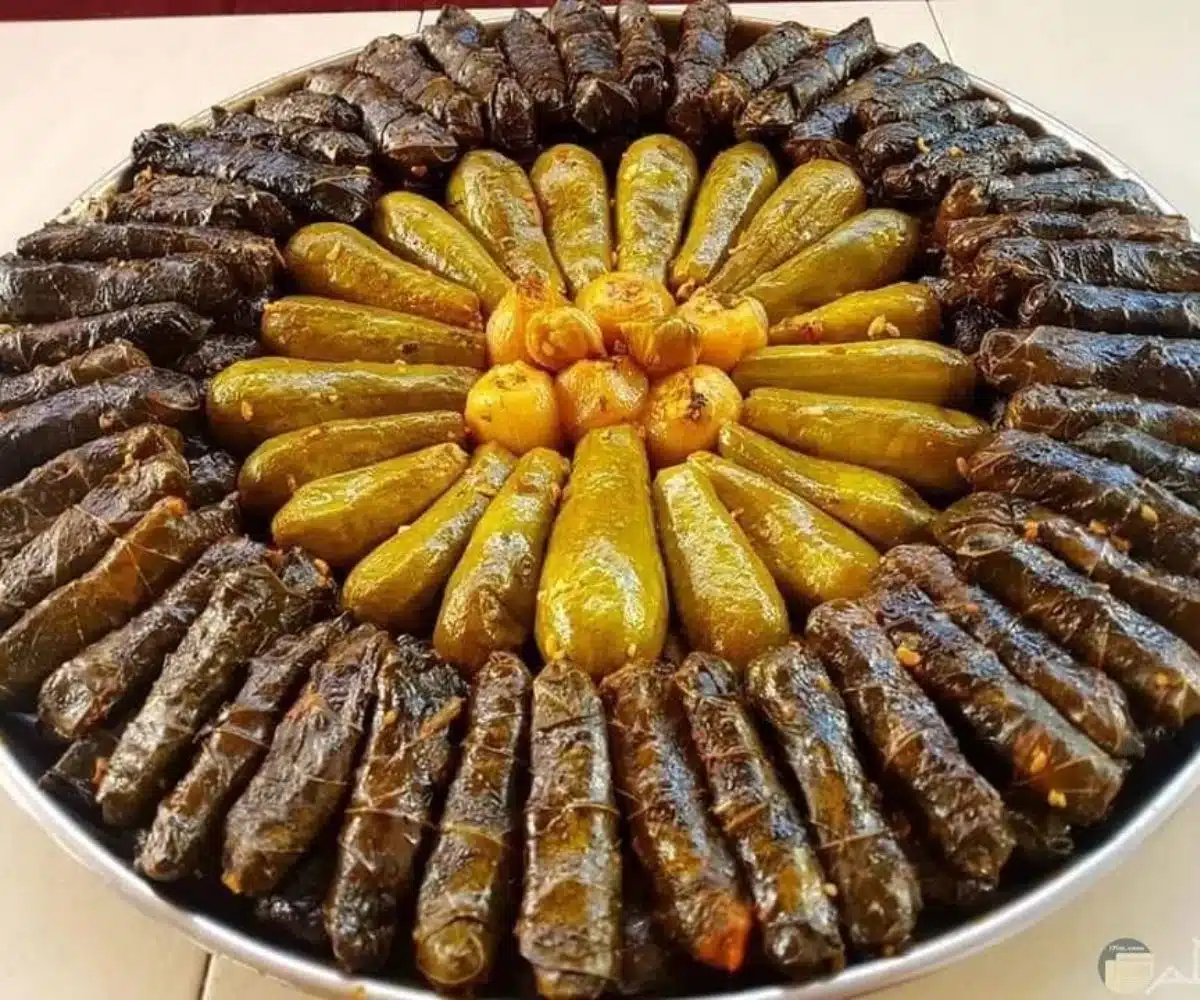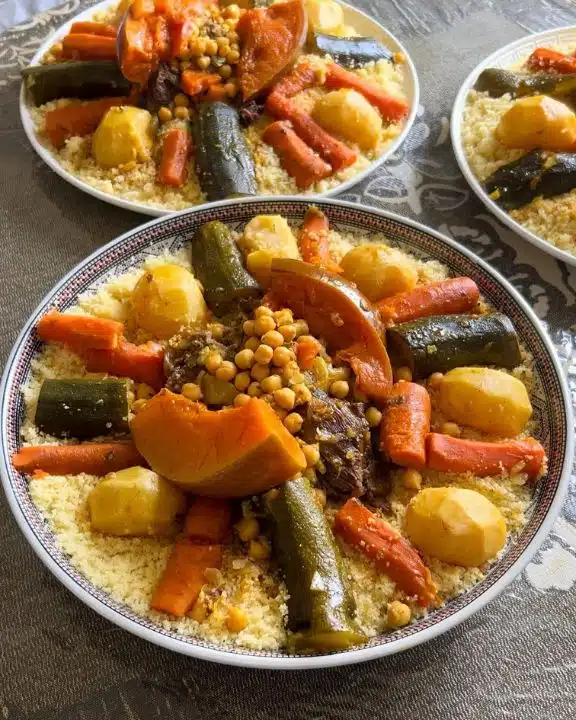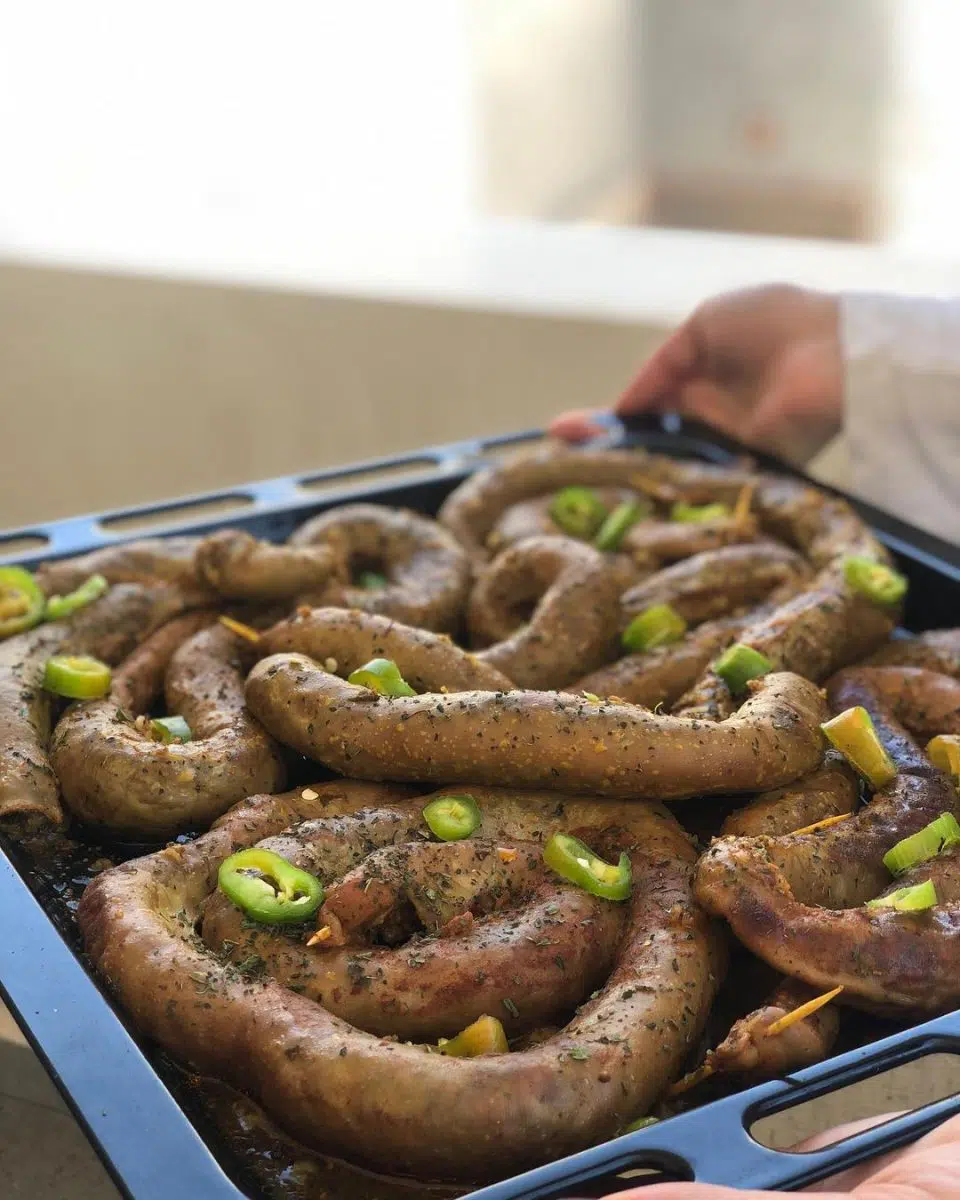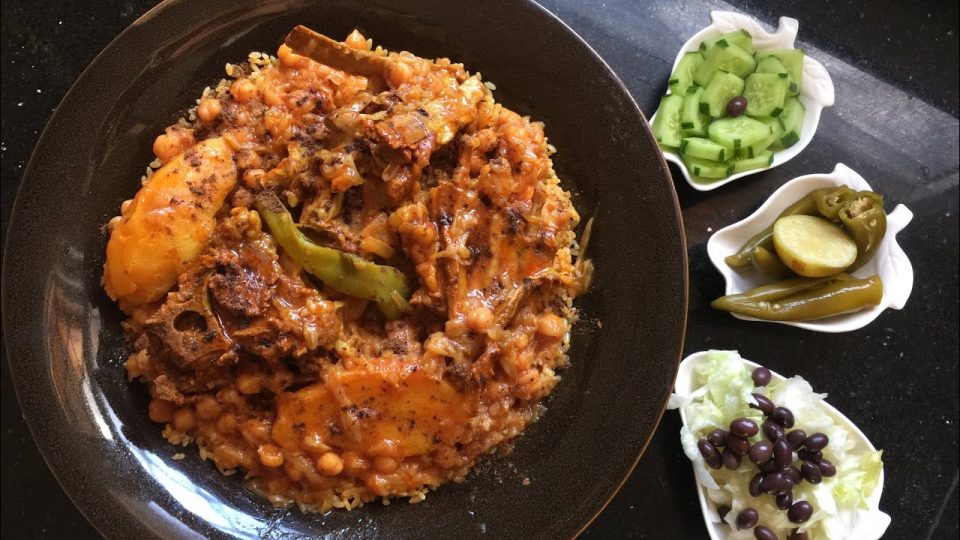Top 22 Most Popular Libyan Foods

Libya is bordered by the Mediterranean Sea to the north, Tunisia and Algeria to the west, Niger and Chad to the south, and Sudan and Egypt to the east; therefore, you will find that a lot of Libyan dishes are similar to the cuisine served in its neighboring North African countries and the Middle East.
However, Libya was part of the Ottoman Empire for more than two centuries as well as an Italian colony, so both the Turkish and Italian cuisines have left their mark on the Libyan cuisine.
The Italian Colonial Empire still has a huge impact on Libyan cuisine. For example, one of Libya’s most commonly cooked dishes (Mbkabka) is a pasta dish similar to Italian pasta, with a slight adjustment of flavor for Libyan tastes.

Lamb is the meat of choice in Libya, while hot peppers are the most commonly used vegetable. Last but not least, most Libyan dishes are spicy.
When visiting Libya as a tourist, you will be amazed by the number of restaurants, takeaways and cafes in the streets. Libyans enjoy eating out as much as they enjoy the night life. The majority of places close really late at night, and they serve a variety of modern fast food, such as burgers, pizza, shawarma, falafel, KFC, etc…
Lamb is the meat of choice in Libya.
Although the locals enjoy eating out, they are also strongly attached to their traditional Libyan cuisine and culture. Friday is a special day with a holy feeling. It’s the first day of the weekend (Friday and Saturday) when Libyans freshen up to go to Friday prayers after having breakfast with the family (usually Fteera, Sfenz or Asida).
Afterwards, as men return the Friday prayers, the family gathers for lunch. This is usually a traditional dish of either couscous, bazeen, roz belbosla or rishta. This tradition has been passed on for generations and is still practiced today.Another tradition is that of enjoying a cup of tea with a sweet dessert such as maghrout, ghrayba or baklava in the evening when the family and friends get together.
Now let’s round-up some of the most popular traditional Libyan foods.
1. Couscous (كسكسي)

Couscous is an incredibly popular part of traditional Libyan cuisine. Made from semolina it is widely enjoyed across North Africa.
Although in English it’s pronounced “couscous,” in Libya you’ll hear it pronounced with an extra “e” at the end. There are two main types of couscous:
- Couscouse belbusla
- Couscouse belkhodra (with vegetables)
The first type does not contain many vegetables and mainly consists of onions, spicy sauce, chickpeas, and plenty of meat. The second type, couscouse belkhodra, also contains vegetables in addition to the first type of ingredients.
Inexplicably, Libyan couscous was dismissed from UNESCO’s inclusion of couscous from Morocco, Tunisia, Algeria, and Mauritania on the World Intangible Cultural Heritage List in January 2021. So an event in Ghadames, southern Libya, was launched in the hope of making the case for the inclusion of Libyan couscous.
The world’s largest plate of couscous was prepared with a diameter of 4.5 meters, weighing 1,200 kilograms, and containing 375 kilograms of dried meat, in addition to large quantities of butter, chickpeas, onions, and spices, and serving 5000 people.
2. Asida (عصيدة)

Asida is a sweet dish well known across Libya, usually cooked in gatherings, and especially at child birth celebrations or within family gatherings during the holidays.
The ingredients of Asida are really simple. It consists of wheat flour, olive oil, and butter to make a thick, slimy dough texture, and it’s topped with either a date syrup (Rub) or honey.
3. Bazeen (بازين)

Bazeen is a popular dish cooked everywhere in Libya. However, each city in Libya cooks Bazeen with slightly different ingredients.
The most common way of cooking Bazeen in Libya is making a thick, slimy dough texture with pure barley flour, rolling it into a round shape in the middle of the plate, and surrounding it with a rich, spicy tomato sauce, boiled potatoes, boiled eggs, sharp pepper and plenty of meat.
Bazeen is also prepared with fish instead of meat in some cities in Libya, especially in the west. In addition, some places cook it with a spicy chili sauce or crushed beans
4. Osban (عصبان)

Osban are traditional lamb (meat) sausages, especially popular with the Bedouin people of North Africa. They’re made with minced lamb meat and liver, chopped tomatoes, herbs like parsley, mint and basil and a rich combination of turmeric, hot pepper, cinnamon and salt
The sausages are slowly cooked in a large pan of spicy tomato sauce until they’re well cooked and tender.
In Libya, Osban is traditionally prepared for the Islamic ‘Eid Al Adha celebration, alongside a couscous dish and with other meat dishes such as glaia (grilled or fried meat).
5. Mbaten (مبطن)

Mbaten is the name used for this dish in western Libya (Tripoli, Musrata, el Zawia, etc.) However, in eastern Libya (Benghazi, Elbayda, Darna, etc.) you’ll hear it referred to as “batat mbatna.”
This delicious appetizer is made of potatoes filled with a mixture of minced meat, parsley and spices, coated in flour and eggs, and then fried in vegetable oil until fully cooked and crispy.
This appetizer is famously cooked for gatherings, parties, weddings, and served during ‘Eid el Fitr alongside a bowl of bean sauce (Fasolia).
6. Roz belbosla (رز بالبصلة)

This dish is similar to couscouse. Cooked rice is covered with a mouthwatering spicy sauce packed with finely chopped onions, chickpeas, and plenty of meat.
When it includes vegetables such as potatoes, pumpkin, eggplant or zucchini, the dish is called Roz msagy.
7. Tajeen jaban (طاجين جبن)

This is a very common appetizer in most Libyan cities. The ingredients used to make this dish can be very varied. However, it’s always based on a mix of chopped potatoes, coriander, parsley, cheese, crumbled bread, and plenty of spices. .
In addition, it can include either minced meat or chopped chicken.
Each cook will have their own twist and may include chopped vegetables, such as carrots, eggplant, or zucchini alongside the potatoes.
It is oven cooked in a casserole until the mixture becomes tender and the whole neighborhood is filled with the irresistible aroma.
8. Rishta Kiskas (رشدة كسكاس)

Rishda kiskas is a very popular Libyan dish. It is cooked with a special type of homemade delicate, fine pasta covered with a red sauce consisting of chopped onions, chickpeas and plenty of meat.
What makes this dish so appealing is the smell of blossom water added to the pasta that gives the dish a unique floral fragrance.
It is also traditionally served at weddings and other special gatherings.
9. Rishta Bourma (رشدة برمة)

Although this dish has a similar name to Rishta Kiskas, a completely different type of homemade, thickly-sliced pasta is cooked in a red chili sauce with dried meat, chickpeas, peas, pepper, and a mixture of spices.
People in Libya usually cook this warming dish during cold weather as it’s guaranteed to ward off the winter chills.
10. Mbakbka (مبكبكة)

This is one of the quickest Libyan meals to prepare for lunch or dinner, as it’s really handy and contains simple ingredients.
Any type of pasta is cooked in a red chili sauce with meat, chicken, or sea food with chopped onions, tomatoes, green pepper, and, as always, a mixture of spices.
Although it’s a popular weekday meal, it’s also a firm favorite on picnics and beach trips.
11. Tbahej Be El Hoot (طباهج بالحوت)

Given the fact that Libya is on the Mediterranean Sea, it’s no surprise that fish and seafood play a big part in Libyan cuisine.
Tbahej is a delicious red paste or sauce that can be served with different types of fish. It is a garnish for fried vegetables such as potatoes, zucchinis, eggplants, and green peppers, and typically served alongside fried fish such as sardines, murjan, trilia, orate, etc.
For more Mediterranean dishes, check out our story on the most iconic Mediterranean foods.
12. Aslooz (عسلوز)

Aslooz is a seasonal dish, cooked with the plant Aslooz, which grows wild across the country, and is harvested in January and February. This native herb is something that’s unique to Libyan cuisine, so if you come across it – try it and taste something absolutely new!.
Aslooz is chopped and cooked with couscous and topped with a sauce made of pumpkin, garlic, pepper, and carrots.
13. Ftat (فتات)

Ftat is made out of fteera (a type of pastry similar to pitta bread), cut in small pieces, and topped with a red oniony sauce and meat (busla).
Ftat is mostly common in the mountains in western Libya (Amazigh). The majority of the population of this region are Berbers and ftat is a traditional part of their cuisine.
14. Sfenz or Fteera (سفنزأو فطيرة)

Sfenz is a special pastry cooked in a unique way. The dough is made into a round, flat shape and deep fried. You may sometimes find it filled with a half-cooked egg.
Sfenz is a very popular part of Libyan cuisine, as it’s usually prepared at weekends for breakfast and served alongside a bowl of honey.
Similarly, fteera is also a dough made into a round or square shape. However, it’s more lightly cooked in a pan, and also served with honey.
15. Kefta (كفتة)

Kefta is a type of meat ball topped with fried onions. This dish is mostly prepared in Tripoli, where it is famously known as Kefta Trapelsia.
Other regions in Libya do not cook this dish very often, as they are not very familiar with it, however, you’ll find variations throughout North Africa and the Middle East.
16. Magrouth (مقروظ)

Magrouth is a sweet dessert cooked all over Libya and it’s influenced by the cuisine of the neighboring North African countries.
Magrouth is made of thick pastry (cookie dough) filled with luscious date paste and afterwards soaked in honey.
It is prepared for celebrations or gatherings such as parties or weddings, and usually served alongside a cup of tea.
17. Abamber (عمبمر)

Abamber is a delicate, soft dessert that resembles a cookie and it is made out of a ground almond and coconut mixture.
Abamber is an iconic Libyan dessert served at weddings across the country. It is usually accompanied by a delicious glass of almond milk.
18. Mathroda (مثرودة)

This wonderful sweet pastry is only made in eastern Libya (Benghazi, Elbayda, etc.). It consists of the pastry called fteera, cut into small pieces, garnished with a mixture of nuts, dates, raisins, and drizzled with honey.
19. Debla (دبلة)

Debla is a famous Libyan dessert, made mostly during the holy month of Ramadan. Delicate, flaky dough is formed into a flower-shaped pastry, deep fried, and then soaked in honey and sprinkled with sesame seeds.
20. Ghraybeh (غريبة)

This is similar to a shortbread cookie, typically made with butter, flour, sugar, almonds, and nuts. This traditional treat is often made around Ramadan and Eid to serve to guests.
21. Grenat

Grenat is made from the same cookie dough as Ghhraybeh; however, it is made into a characteristic half moon shape. Once baked, a garnish of powdered sugar or chocolate with nuts adds a luscious finishing touch.
22. Dolma (دولما)

From 1551 to 1864 the coastal region of Libya was ruled by the Ottoman Empire.Therefore, Libyan cuisine is heavily influenced by Turkish food, in addition to the Italian and neighboring Egyptian and Tunisian gastronomy.
Dishes such as dolma, baklava, lentil soup, and Kaak are great examples of the Turkish culinary influence in Libya.
Dolma is a family of stuffed dishes well known throughout Central Asia and the Middle East. A vegetable leaf is used as a wrap for a filling or stuffing that consists of a mixture of chopped herbs (coriander, parsley, spring onion, and mint) along with minced meat, tomato, rice ,and a variety of spices.
Did we include your favorite Libyan recipes? Let us know in the comments below and share your suggestions with our community!

